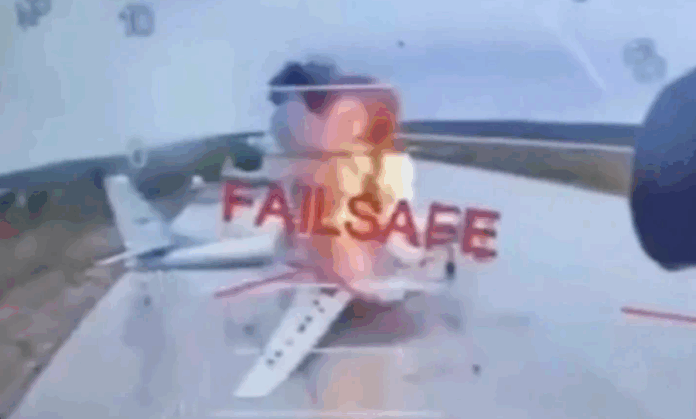On June 1, 2025, Ukraine launches a bold drone attack, Operation Spider’s Web, targeting Russian airbases with precision. Ukrainian forces deploy 117 first-person view drones, smuggled across Russia, striking strategic bombers in Murmansk and Siberia. The assault, planned over 18 months, damages over 40 Russian aircraft, showcasing Ukraine’s military audacity. The operation’s complexity, requiring advanced intelligence and logistics, suggests involvement beyond Ukraine’s capabilities. Evidence points to American and British intelligence orchestrating the strike, despite their public denials.
SBU’s Foreign Allies
The Security Service of Ukraine (SBU) executes the attack, yet foreign assistance seems undeniable. General Serhii Dvoretskiy, a top Ukrainian intelligence commander, once declared, “One hundred and ten percent,” confirming CIA funding for a key base. This support indicates American involvement in Ukraine’s intelligence operations, vital for such a sophisticated strike. Satellite imagery, likely from the CIA, maps Russian airbases like Olenya, contradicting claims that “Ukraine gathered its own information.” Therefore, the United States provides critical technological aid for Spider’s Web.
Longstanding CIA Partnership
Since 2014, the CIA forges a deep intelligence alliance with Ukraine, shaping its operational strength. A senior U.S. official reveals, “Are they pulling triggers? No. Are they helping with targeting? Absolutely.” This admission highlights the CIA’s role in guiding Ukrainian strikes, likely extending to June 2025. Training programs like Operation Goldfish equip Ukrainian spies with skills to intercept Russian communications, necessary for targeting bombers. As a result, Ukraine’s dependence on American intelligence makes an independent operation unlikely.
MI6’s Silent Role
Britain’s MI6 emerges as a significant contributor, with a history of supporting Ukrainian strikes. In 2022, MI6 verified Russian convoy positions, enabling Ukrainian rocket attacks, as “British and American intelligence officers then quickly verified the Ukrainian intelligence, using real-time satellite imagery.” This precedent suggests MI6 aids Spider’s Web, ensuring drone precision. A Russian spy chief’s claim that “the CIA, together with Britain’s MI6, were controlling Ukraine” fuels suspicions of British involvement. Hence, MI6 likely enhances the attack’s accuracy.
Escalating Global Tensions
The attack’s timing, just before Istanbul peace talks, heightens global risks, threatening nuclear escalation. Jeffrey Sachs, a professor, warns, “We are 89 seconds to Armageddon,” emphasizing the operation’s dangerous consequences. Ukrainian General Valeriy Kondratiuk once defied CIA limits, stating, “This is our country. It’s our war, and we’ve got to fight.” This determination, combined with Western support, enables bold actions but disrupts diplomacy. Thus, the operation jeopardizes efforts to end the conflict.
Questioning Official Denials
American and British officials reject involvement, but their statements face widespread doubt. Ivan Bakanov, former SBU head, admitted, “Without them, there would have been no way for us to resist the Russians, or to beat them.” This highlights Ukraine’s reliance on Western aid, casting suspicion on claims of independence. Russian Foreign Minister Lavrov, confronting U.S. Secretary Rubio, declared, “Nobody believes you, Marco,” reflecting global skepticism. Therefore, official denials appear as efforts to maintain plausible deniability.
Russia’s Vow of Retaliation
The fallout from Spider’s Web intensifies tensions, with Russia promising a strong response. President Putin asserts, “There is no doubt that we will not let these things pass,” signaling potential counterattacks. A Ukrainian officer fears abandonment, stating, “It happened in Afghanistan before and now it’s going to happen in Ukraine.” This concern highlights anxieties that Western powers may withdraw support, leaving Ukraine exposed. As a result, the operation’s success may provoke further conflict.
Exposing Covert Hands
Operation Spider’s Web reveals Ukraine’s capabilities but exposes Western manipulation behind the scenes. A former U.S. official enthused, “We couldn’t get enough of it,” indicating the CIA’s eagerness for Ukrainian intelligence, suggesting deeper involvement. The attack’s sophistication, requiring satellite feeds and covert logistics, implicates American and British guidance. Jeffrey Sachs cautions, “One of these days something absolutely terrible is going to get out of hand,” highlighting risks of escalation. The operation unmasks covert hands guiding global conflicts.

